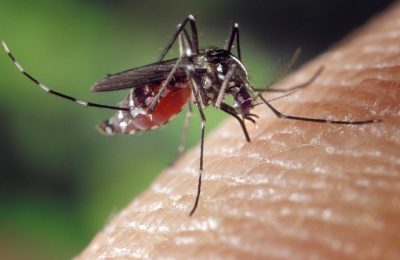GMO Mosquitoes Set for Release in California to Quell Disease
The modified male mosquitoes carry a gene that — when passed to their offspring — kills the youngsters.

All Global Research articles can be read in 51 languages by activating the “Translate Website” drop down menu on the top banner of our home page (Desktop version).
To receive Global Research’s Daily Newsletter (selected articles), click here.
Visit and follow us on Instagram at @globalresearch_crg and Twitter at @crglobalization.
***
The U.S. Environmental Protection Agency approved the experimental use of genetically engineered mosquitoes in California and Florida to reduce the populations of invasive mosquitoes that carry a host of infectious diseases like Zika and dengue fever.
“With mosquito and vector-borne diseases a growing concern in California, we see Oxitec’s technology as an important additional option to control the invasive Aedes aegypti mosquito,” said Dr. Mustapha Debboun, general manager of the Delta Mosquito and Vector Control District, a government agency in the Central Valley. “We look forward to working in partnership with Oxitec and have been impressed with results from their previous projects in Brazil and the Florida Keys.”
The Aedes aegypti mosquitoes were historically relegated to tropical and subtropical zones but have since invaded every continent on Earth except Antarctica. They are capable of bringing the diseases that plague tropical regions with them.
So U.K.-based agrotech company Oxitec engineered male mosquitoes with a gene that can kill Aedes aegypti mosquitoes. When the engineered males mate with females — the only gender that bites — their offspring die before reaching maturity.
“We just surpassed more than 1 billion mosquitoes produced for release globally, making our technology the most widely-deployed mosquito-based vector control technology in the world,” the company said in a recent release.
The EPA granted an experimental use permit on Monday that will allow the company to deploy more mosquitoes throughout four California counties located in the Central Valley — Fresno, Tulare, Stanislaus and San Bernardino. The permit also allows for a pilot project to be located Monroe County, Florida.
The upcoming release will be the largest release of genetically engineered insects in world history. But not everyone is happy about it.
Friends of the Earth, an environmental advocacy organization, said the organization is becoming increasingly alarmed by Oxitec’s approach to disease eradication and pest control, saying there is a lack of information regarding how the introduction of altered mosquitoes would affect wildlife and human health.
“Scientists have found genetic material from GE mosquitoes in wild populations at significant levels, which means GE mosquitoes are not sterile,” said Dana Perls of Friends of the Earth. “The mosquitoes could result in far more health and environmental problems than they would solve.”
Other critics point to the lack of prominent tropical diseases in California.
“This experiment is unnecessary and even dangerous, as there are no locally acquired cases of dengue, yellow fever, chikungunya or Zika in California,” said Jaydee Hanson, policy director with the Center for Food Safety. ”Releasing billions of GE mosquitoes makes it likely that female GE mosquitoes will get out and create hybrid mosquitoes that are more virulent and aggressive.”
Oxitec pushed back on these characterizations saying the identification of genetic material indicating altered mosquitoes are not sterile has only been speculation and lacks scientific evidence. The company also says the presence of Aedes aegypti mosquitoes in California significantly increases the risk of tropical diseases like Zika and dengue fever.
But critics fear allowing the new genetically altered mosquitoes to mate with existing species will have unintended consequences that could impact the food web, the agricultural process and human health.
“Once released into the environment, genetically engineered mosquitoes cannot be recalled,” said Dr. Robert Gould, president of San Francisco Bay Physicians for Social Responsibility. “Rather than forge ahead with an unregulated open-air genetic experiment, we need precautionary action, transparent data and appropriate risk assessments.”
Similar experiments have been conducted in Florida and Brazil to date without immediately observable harm, but critics want the agency to proceed more care and caution. Those releases have also been studied and so far mixed results have been reported.
A recent study conducted by Yale scientists concluded that two years of releases in Brazil failed to reduce the population of Aedes aegypti mosquitos. But Oxitec says its methods have proven more promising than mass spraying of insecticides and other similar methods of control and said it will continue to learn from trials in Florida, California and other countries.
The mosquitoes are scheduled to be released in California for the first time this coming summer.
*
Note to readers: Please click the share buttons above or below. Follow us on Instagram, @globalresearch_crg and Twitter at @crglobalization. Forward this article to your email lists. Crosspost on your blog site, internet forums, etc.
Featured image is from CNS

